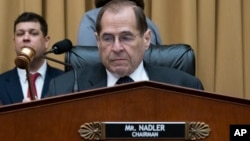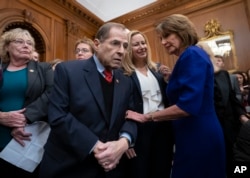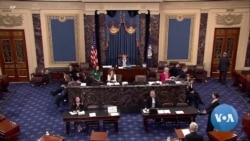The U.S. House Judiciary Committee is proceeding Wednesday with its consideration of whether to hold Attorney General William Barr in contempt of Congress over the Justice Department's refusal to provide an unredacted copy of special counsel Robert Mueller's report on his investigation of Russian election interference.
Committee leaders and Justice Department officials met Tuesday to try to resolve the dispute, but the two sides each issued statements late in the day indicating they remained far apart.
In short, the Justice Department threatened to request that President Donald Trump invoke executive privilege over the materials the committee asked for in its subpoena, if it goes ahead with the contempt vote Wednesday.
Nadler responded by saying the Justice Department's legal arguments lack credibility or legal basis, and further accused it of conducting "dangerous" obstruction.
The Justice Department's positions came in the form of a letter to Nadler from Assistant Attorney General Stephen Boyd who accused Nadler's committee of making "unreasonable demands" and provoking "an unnecessary conflict between our respective branches of government."
Boyd said the Justice Department had acted within the law and regulations by offering a copy of the Mueller report "with as few redactions as possible," but said committee leaders escalated the dispute by demanding all committee members be allowed to review that version, something he said would "risk violating court orders" in some ongoing cases.
Boyd asked Nadler to put the Mueller report subpoena on hold for now and to delay Wednesday's contempt vote.
Nadler in his statement said the White House had long ago waived its executive privilege over the materials requested in the subpoena, which include not only the full Mueller report but also the underlying documents from the investigation of Russia's interference with the 2016 election, whether members of Trump's campaign colluded with Russia, and whether the president obstructed justice.
"The Department's decision reflects President Trump's blanket defiance of Congress's constitutionally mandated duties," Nadler said. "I expect that Congress will have no choice but to confront the behavior of this lawless administration. The Committee will also take a hard look at the officials who are enabling this cover up."
If the Democrat-controlled Judiciary Committee approves the contempt citation for the attorney general, it would be taken up by the full House of Representatives. In theory, someone held in contempt could eventually be tried and, if convicted, face up to a year in prison. The Justice Department rarely pursues such referrals from Congress.
WATCH: Mueller report debate continues
Nadler's committee is also considering whether to hold Donald McGahn, the former White House counsel, in contempt of Congress if he refuses to testify before the committee later this month about the Mueller probe.
McGahn on Tuesday refused to comply with a subpoena for documents related to the investigation. The White House had demanded he ignore the subpoena, and his lawyer said the documents were property of the White House and as such McGahn had no right to them.
Nadler rejected that argument, saying the White House had also not invoked executive privilege over those materials.
House Democrats are pushing for Mueller to testify about his handling of the investigation.
Barr has said he had no objection to letting Mueller testify before Congress about his investigation. But Trump on Sunday changed his mind, saying, "Bob Mueller should not testify. No redos for the Dems!" No agreement has been reached for Mueller's testimony.
Barr last month released a redacted copy of the Mueller report, with the prosecutor concluding neither Trump nor his campaign colluded with Russia, but reached no conclusion whether Trump, as president, obstructed justice during the 22-month investigation. Barr decided the findings did not warrant obstruction charges against the president.
In an online statement under the name DOJ Alumni, more than 700 former federal prosecutors, so far, who worked in Republican and Democratic administrations said evidence Mueller uncovered would have resulted in obstruction charges against Trump, were it not for the long-standing Justice Department policy that a sitting president cannot be charged with a criminal offense.
U.S. Senate Republican leader Mitch McConnell says it is time for lawmakers to move on from the Russia investigation.
"Case closed," McConnell said on the Senate floor. McConnell derided what he said was the "outrage industrial complex" of Democrats and television news show pundits over special counsel Robert Mueller's conclusion that Trump did not collude with Russians to help him win.
"The investigation went on for two years," he said. "It's finally over."
Top Democratic leaders immediately disputed McConnell. Senate Democratic leader Charles Schumer called McConnell's remarks "an astounding bit of whitewashing," while House Speaker Nancy Pelosi said, "That's just not a fact. The case is not closed."































